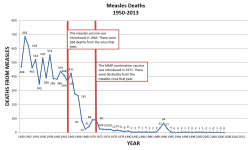Well done on your clear demonstration of 'How to mislead with graphs'.
A number of modern medical techniques introduced after WWI allowed the death rate from Measles in the US to fall from the previously horrifying 5-15 per 100,000 to a mere few hundred per annum - few enough to barely register on your graph. Complications that had previously been fatal in many cases became merely terrifying and debilitating, which was a big step forward.
But this only tells us that your graph is incapable of detecting whether or not the vaccine was effective.
To determine that question, we need to zoom in a bit:
View attachment 20692
(
Source)
Hundreds of deaths per annum in the US is a small number per 100,000 - but it's not a small number. And it's VERY significantly more than zero.
Choosing a scale that goes from 0 to 16 to hide an effect that ranges between 0 and 1 is very sneaky; And I suppose we could give the people who do this some credit for their cleverness - if they weren't using it to conceal the easily avoidable deaths of hundreds of children a year.
ETA - See that 'spike' in deaths in 1990? This was due to an epidemic in California, and that event was very closely studied, because it had been thought that Measles was a thing of the past. So why did it happen?
During 1988 through 1990, California experienced its worst measles epidemic in more than a decade, with 16,400 reported cases, 3,390 hospital admissions, and 75 deaths. More than half of the patients were younger than 5 years; the highest incidence was among infants younger than 12 months. The epidemic centered in low-income Hispanic communities in southern and central California. The major cause of the epidemic was low immunization levels among preschool-aged children and young adults. Rates of complications, admission to hospital, and death were surprisingly high. Outbreak control efforts met with indeterminate success. Problems with these efforts included insufficient funding early in the epidemic and disappointing public response to community-based immunization campaigns. The cost of medical care and outbreak control for the epidemic is conservatively estimated at $30.9 million. Unless the level of immunization in preschool-aged children is increased, this type of epidemic will probably recur.
(My bold.
Source).


